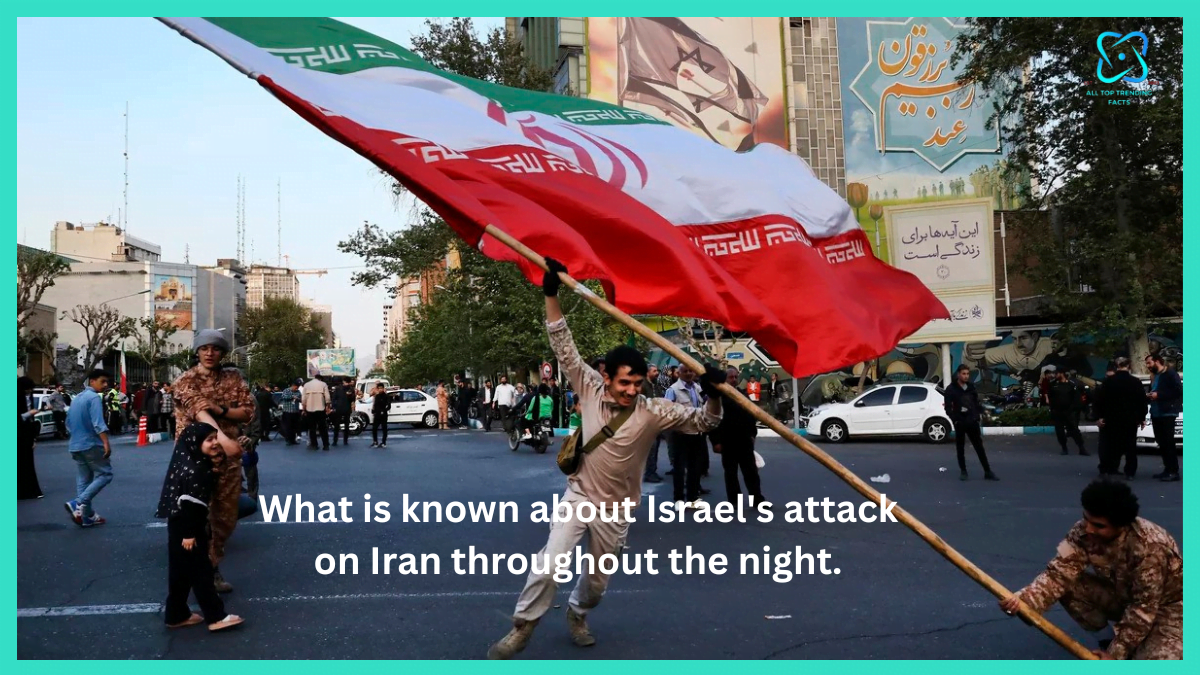
According to US sources, Israel launched a missile attack against Iran late on Friday night in what looks to be retaliation for weeks of rising hostilities between the two nations.
The intensity of the strike on the Isfahan region and the amount of any damage are the subject of conflicting allegations, with the Iranian state media downplaying the significance of the event.
It follows weeks of high-level hostilities between the rivals in the area, which have already resulted in an Israeli strike on an Iranian property in Syria and an unprecedented attack on Israel by Iran.
Here is what we currently know about the most recent event.
How can we tell if a strike has occurred?
Israel rarely provides confirmation for its military operations, which have frequently targeted armed organisations in Syria and Iraq that get Iranian support.
Still, US authorities have verified to CBS News, a BBC partner, that an Israeli missile struck Iran early on Friday morning.
The kind of weaponry and the location of their launch are unknown.
Iran claimed that tiny drones were used in the strike, but US officials claimed that a missile was used.
Access to Iran is strictly regulated by the government. The incident occurred overnight in the central district of Isfahan, to which the BBC does not have direct access.
YOU CAN CHECK OUT THIS VIDEO FOR MORE INFORMATION
Regarding the strike, what is Iran saying?
Although Iranian media and officials have acknowledged the existence of an attempted strike, they are downplaying its importance. No casualties have been reported.
According to Iran’s Fars news agency, air defense systems were triggered after explosions were reported close to an army base.
An Isfahan general was cited by a state media outlet as saying that no damage had occurred and that the explosions heard in the region were “due to air defence firing at suspicious objects”.
The powerful Islamic Revolution Guard Corps military branch of Iran is connected to the semi-official Tasnim news agency, which published a video of an Isfahan nuclear site that appeared to be unaffected by any damage.
The nuclear sites in Iran have not sustained any damage, as certified by the International Atomic Energy Agency.
A representative for Iran’s National Centre of Cyberspace, Hossein Dalirian, stated that “no air attack from outside borders” had occurred.
He stated that Israel had “only made a failed and humiliating attempt to fly quadcopters [drones] and the quadcopters have also been shot down”.
Shortly after the incident, Iran placed limitations on commercial planes, although those have already been eased.
Overnight, there were additional reports of explosions in Syria and Iraq, home to armed organizations supported by Iran; however, it is unclear if these incidents had anything to do with the Isfahan strike.
Early on Friday morning local time, an Israeli missile struck an air defense position in the southern region of Syria, according to the Syrian Defence Ministry. Israel has not acknowledged ordering the attack.
Why now, and why was Isfahan targeted?
The province of Isfahan is a sizable region in central Iran that has the name of its biggest metropolis.
Significant Iranian military infrastructure, such as a sizable airbase, a sizable missile production complex, and multiple nuclear sites, are located in the area.
Normally, Israel would alert the US before taking military action, but during the G7 conference in Capri, Italy’s foreign minister Antonio Tajani warned reporters that Washington was “informed at the very last minute”.
US Secretary of State Antony Blinken spoke at the summit, stating that the US had “not been involved in any offensive operations” but declining to comment further on the attack.
Map displaying Iran and Israel
Less than a week has passed since Iran launched hundreds of missiles and drones toward Israel, which was perceived as a sharp increase in hostilities. This current strike follows that attack.
Iran launched an unprecedented and massive onslaught, but it was mainly ineffective since Israeli air defenses, assisted by the US, UK, and other allies, shot down the great majority of the rockets.
The first assault against a building on an Iranian diplomatic compound in Syria on April 1 prompted that historic attack on Israeli territory.
Although it is widely believed that Israel was behind that strike, Israel has not publicly acknowledged this either.
line
LATEST: Get real-time updates on Israel-Iran news.
HISTORY: Why have attacks taken place between Iran and Israel?
ANALYSIS: Crisis demonstrates how little Israel and Iran comprehend one another REACTION: As the US claims that Israel has hit Iran, the price of oil soars.
Will Israel and Iran’s hostilities rise as a result of this?
It’s still unclear how serious this most recent strike is, and it’s unclear if Iran would try to retaliate.
The scope of Friday’s attack was described as “limited, almost symbolic” by BBC security correspondent Frank Gardener, who speculated that it might have been planned to ensure the dispute doesn’t escalate further.
According to BBC international editor Jeremy Bowen, Israeli Prime Minister Benjamin Netanyahu will face conflicting pressure to retaliate against Iran from some of his own generals and political supporters.
EPA Iranian military personnel on display EPA
Despite having strong armed forces, Israel and Iran have avoided open warfare.
The US and other Western allies have placed intense pressure on Israel to refrain from taking any actions that could escalate the long-running proxy war between the two rival Middle Eastern nations into a direct confrontation.
This escalation of hostilities occurs against the backdrop of the Israeli military’s conflict with Hamas, which is supported by Iran, in Gaza.
What response has there been in Israel and globally?
The political divide in Israel has been brought to light by some of the comments from within the nation.
Itamar Ben Gvir, the ultranationalist minister of security, called the attack on Iran “lame” or “feeble”.
Yair Lapid, the head of the Israeli opposition, responded by demanding that he be fired and claiming that his comment had denigrated and disgraced Israel.
The UK government stated that while it would not comment on the strike, Israel should exercise its “right to self-defence” and refrain from “significant escalation.”
Ursula von der Leyen, President of the European Commission, urged all parties to hold off on taking additional measures.
What reaction has the global economy had?
There are worries that the Middle East’s escalating war may cut off oil supply.
Following the incident, the price of oil, measured by the global benchmark Brent crude, increased by 1.8% to $88 per barrel.
At first, oil prices had increased by up to 3.5%, but as it became more apparent that the strike was limited, the price steadied.
Gold, which is sometimes regarded as a secure investment in difficult times, almost reached a record-high price before reverting to about $2,400 an ounce.
CLICK HERE FOR MORE SPORTS NEWS: POLITICS

“Hello Everyone” Myself Joydip DN, and I Live in Sylhet And I am a Seasoned Digital Marketer, Accomplished Content Writer, Experienced Blogger And Combines A Wealth of Experience In Online Marketing Trained From Freelancer Lab Academy, With A Strong Linguistic Proficiency, Evident In My Impressive IELTS Band Score. Holding An, MBA With A Major In Management Information System(MIS) From Leading University. I Am(Joydip) Seamlessly Integrates Strategic Business Insights With Technological Acumen To Deliver Organic And Impactful And Results-Driven Content In The Dynamic Digital Landscape.”






